Why the EU-Japan trade pact is a big deal for Trump
–
On Thursday, the European Union and Japan announced an agreement on a new trade deal.
Coming just one day before the start of the G-20 meeting in Germany, this deal is also seen as something of a rebuke to the antagonistic trade talk President Donald Trump made a cornerstone of his campaign and which has featured prominently in the early days of his presidency.
On Wednesday, for example, Trump tweeted that the United States has “made some of the worst Trade Deals in world history. [Why] should we continue these deals with countries that do not help us?”
Trump has also repeatedly referenced America’s “bad” or “one-sided” trade deals in the last 18 months.

In a statement, the European Commission called this “the most important bilateral trade agreement ever concluded by the EU.” The Commission added that this deal will “for the first time include a specific commitment to the Paris climate agreement.” Recall that earlier this year Trump said he had withdrawn the U.S. from the Paris climate agreement.
The New York Times writes that this deal is “an act of geopolitical theater,” and indeed it is. But that the EU and Japan reached a deal which had been in the works for years shows that while the Brexit vote and Trump’s victory were seen as signs that something like the “western neoliberal order” was cracking, these proclamations may have been either premature or misguided.
No one leader can change the world economy in one fell swoop
At the risk of making the EU-Japan trade deal something it is not — this deal does not show that everything is “fixed” or that the U.S.’s involvement in foreign affairs is now meaningless — it is worth emphasizing that this is an agreement in principle, a diplomatic show of force about which interests some of the world’s leading powers want to protect: free trade and economic collaboration chief among them.
But against a backdrop of the gnawing sense that something fundamental about the world order we thought we knew having changed in a post-Trump world, this deal is also a reminder no one world leader — U.S. president or otherwise — is likely in one fell swoop to alter international economic alignments.

A recent report from Pew Research, for example, found that in the last year support for the EU among many member countries — notably Spain, Germany, France, and the Netherlands — rose sharply. Additionally, a report from CNN Money this week suggested Mexico and China could be in talks on a new trade deal. Both countries have been the target of perhaps Trump’s strongest rebukes of existing U.S. trade deals.
Among Trump’s first actions as president was signing an executive order pulling the U.S. from the Trans Pacific Partnership, while the administration has also signaled its intention to renegotiate NAFTA.
These actions were very much in line with Trump’s campaign and to be expected after his victory. This also established Trump’s negotiating position in the international community: the U.S. would be seeking to act unilaterally — that is, on a one-to-one basis — with its major trading partners rather than as part of a larger group.
Approach with skepticism
Certainly, both Trump’s win and Brexit came as a shock to the elite establishment not only in the U.S. and the U.K. but around the world as well. In his new book “The Retreat of Western Liberalism,” Edward Luce writes that, “If the intellectual basis of Western liberalism is skepticism, we should learn to live up to its meaning.”
And while this critique is aimed at those who were sure the spread of western liberalism would continue unabated and were left reeling after Brexit and Trump’s win, this cuts both ways.
The EU and Japan may be seizing on a lack of specifics emerging from the Trump administration on its stated desire to re-work the world’s existing series of economic integrations into something it deems more favorable for the U.S. On some reading, this deal may be putting off an inevitable reaction against this kind of free-trade state of play.
But that Trump can or will succeed in putting America first should be viewed with equal skepticism. Financial markets, to a large extent, have largely discounted that the Trump administration will pull off a kind of wholesale re-configuring of the global economic order.
This may be fine for a president who is clearly pleased with the rise in stock prices resulting from bets on a continued status quo.
The real question for Trump, though, is if this will be fine for voters.
—
Myles Udland is a writer at Yahoo Finance. Follow him on Twitter @MylesUdland
Read more from Myles here:

